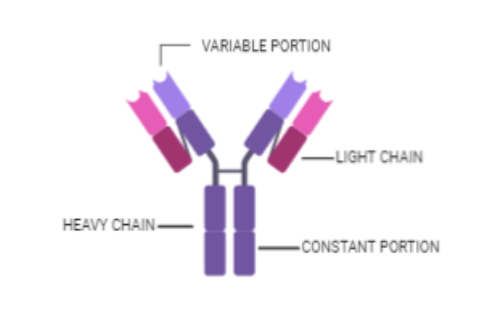
What is immunity? Differentiate between active immunity and passive immunity. Draw the diagram of structure of an antibody molecule.
Answer
583.2k+ views
Hint:
Our body has the ability to fight off unwanted and harmful microorganisms and substances. This happens due to the presence of certain cells, tissues, and organs that work together as part of a system that eliminates foreign substances that can be harmful to the human body. This capability can either be present from birth or develop later in life.
Complete answer:
Immunity refers to our body’s ability to fight against foreign and unwanted microorganisms or substances that can be harmful and cause serious infections. These substances are called antigens. There are two types of immunity – innate and acquired.
INNATE IMMUNITY
Innate immunity is the type of immunity that a person is born with. It can be in the form of physical barriers like skin and mucous membranes. The cells and proteins recognize the foreign particle or organism and help the body to get rid of it. However, the problem with this type of immunity is that the immune system does not remember the antigen and cannot prepare the body for another invasion.
ACQUIRED IMMUNITY
Acquired immunity, also known as adaptive immunity is the type of immunity that the body develops when it is exposed to an antigen. When the body recognizes the antigen, the immune system produces antibodies against it. Through this immunity, the body remembers the antigen and recognizes it in the event of another attack.
Acquired immunity is of two types – active and passive.
ACTIVE IMMUNITY
It is the type of immunity in which the person’s own immune system develops the antibodies against an antigen. This can happen in the case of a disease or immunization. This form of immunity lasts for a long time.
PASSIVE IMMUNITY
For this type of immunity, the person is given antibodies to prevent a disease or when he/she has been exposed to a particular antigen. This type of immunity is fact acting but lasts only for a few days or weeks.

Note: Antibodies are Y-shaped proteins that bind to an antigen and trigger an immune response.
They are also known as immunoglobulins.
Based on differences in the constant portion, antibodies are grouped into 5 classes- IgG, IgM, IgA, IgD, and IgE.
Our body has the ability to fight off unwanted and harmful microorganisms and substances. This happens due to the presence of certain cells, tissues, and organs that work together as part of a system that eliminates foreign substances that can be harmful to the human body. This capability can either be present from birth or develop later in life.
Complete answer:
Immunity refers to our body’s ability to fight against foreign and unwanted microorganisms or substances that can be harmful and cause serious infections. These substances are called antigens. There are two types of immunity – innate and acquired.
INNATE IMMUNITY
Innate immunity is the type of immunity that a person is born with. It can be in the form of physical barriers like skin and mucous membranes. The cells and proteins recognize the foreign particle or organism and help the body to get rid of it. However, the problem with this type of immunity is that the immune system does not remember the antigen and cannot prepare the body for another invasion.
ACQUIRED IMMUNITY
Acquired immunity, also known as adaptive immunity is the type of immunity that the body develops when it is exposed to an antigen. When the body recognizes the antigen, the immune system produces antibodies against it. Through this immunity, the body remembers the antigen and recognizes it in the event of another attack.
Acquired immunity is of two types – active and passive.
ACTIVE IMMUNITY
It is the type of immunity in which the person’s own immune system develops the antibodies against an antigen. This can happen in the case of a disease or immunization. This form of immunity lasts for a long time.
PASSIVE IMMUNITY
For this type of immunity, the person is given antibodies to prevent a disease or when he/she has been exposed to a particular antigen. This type of immunity is fact acting but lasts only for a few days or weeks.

Note: Antibodies are Y-shaped proteins that bind to an antigen and trigger an immune response.
They are also known as immunoglobulins.
Based on differences in the constant portion, antibodies are grouped into 5 classes- IgG, IgM, IgA, IgD, and IgE.
Recently Updated Pages
Master Class 12 Economics: Engaging Questions & Answers for Success

Master Class 12 Physics: Engaging Questions & Answers for Success

Master Class 12 English: Engaging Questions & Answers for Success

Master Class 12 Social Science: Engaging Questions & Answers for Success

Master Class 12 Maths: Engaging Questions & Answers for Success

Master Class 12 Business Studies: Engaging Questions & Answers for Success

Trending doubts
Which are the Top 10 Largest Countries of the World?

What are the major means of transport Explain each class 12 social science CBSE

Draw a labelled sketch of the human eye class 12 physics CBSE

Why cannot DNA pass through cell membranes class 12 biology CBSE

Differentiate between insitu conservation and exsitu class 12 biology CBSE

Draw a neat and well labeled diagram of TS of ovary class 12 biology CBSE




